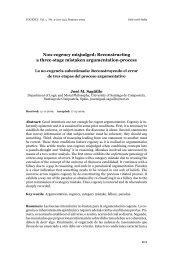Cogency v2 n2
Cogency v2 n2
Cogency v2 n2
You also want an ePaper? Increase the reach of your titles
YUMPU automatically turns print PDFs into web optimized ePapers that Google loves.
COGENCY Vol. 2, N0. 2, Spring 2010<br />
abstract and even disembodied propositions. Any conceptual connections<br />
needed to make them coherent have to be supplied by the reader. It is as if we<br />
are given a series of conclusions without the arguments. Wittgenstein does<br />
not make it easy for the reader!<br />
In the Investigations, the situation is partly mirrored and partly reversed:<br />
we find many arguments, but not many conclusions. Befitting the move to a<br />
more dialogically-oriented conception of philosophy, the arguments in the<br />
Investigations are themselves less logical and more dialogical insofar as<br />
they include all the moves of ordinary conversation rather than just inferences.<br />
They are also more specifically dialectical insofar as they proceed<br />
through objections and replies. They do not follow a beeline to a well-marked<br />
terminus. However, their place in philosophy is no less tenuous in the Investigations<br />
than in the Tractatus. The arguments that appear in the Investigations<br />
are made up of questions and assertions that apparently come<br />
from different voices in genuine engagement, albeit without the closure provided<br />
by definite conclusions, but also without the normal clues available to<br />
readers to identify and distinguish the protagonists and antagonists. It appears<br />
almost as if Wittgenstein were trying not to get his point across. Once<br />
again, Wittgenstein does not make it easy for the reader! And yet the arguments<br />
he puts before us are strangely effective. They are presented as arguments<br />
Wittgenstein is having with himself or colleagues, rather than with<br />
the reader, which is to say they are presented less as arguments to persuade,<br />
convince, or engage us, and more as “spectacles” to affect us.<br />
In the discussion that follows, we will first, identify the nature and role<br />
of argumentation in philosophy according to the Tractatus, followed by a<br />
case study of an argument from the Tractatus. We will then turn to<br />
Wittgenstein’s transitional and later works, paying particular attention to<br />
the interpretive challenge posed by his provocative and deliberate evolution<br />
away from definite assertions in philosophical matters and towards creating<br />
interpretive tensions in his readers in order to achieve greater clarity<br />
in the long run – albeit with less dogmatic confidence. We think this challenge<br />
can be met only after achieving the perspective that comes from having<br />
worked through the Tractatus. While our conclusions are largely negative<br />
concerning the place for arguments in Wittgenstein’s philosophy, conceptual<br />
space is created for a more positive account of argument both in<br />
philosophy and in general.<br />
22








